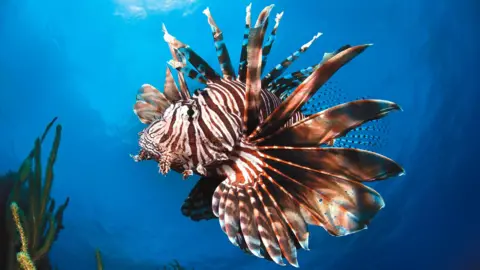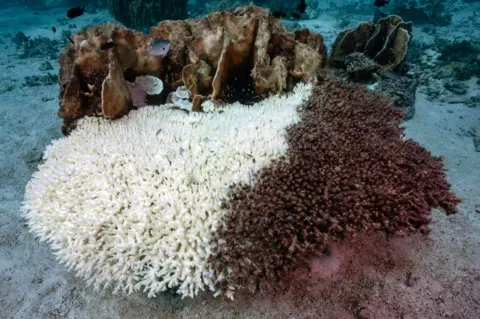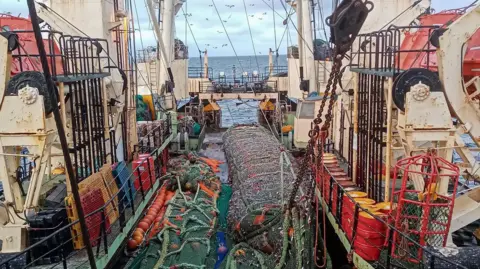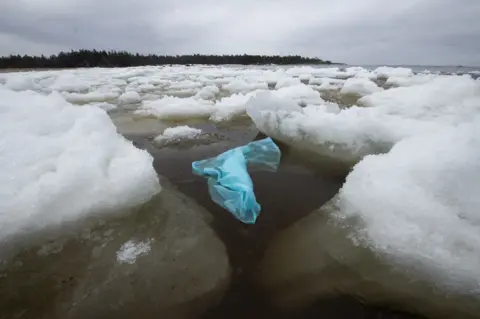'Glimmer of hope' for marine life at UN Ocean conference
 Federico Cabello/Getty Images
Federico Cabello/Getty ImagesThe UN Ocean conference has been heralded a success, with more countries ratifying a key treaty to protect marine life and more progress on curbing plastics and illegal fishing in our seas.
Nearly 200 countries came together in Nice, France to discuss how to tackle the most pressing issues facing the oceans.
The world's seas are facing threats on multiple fronts from plastic pollution to climate change.
Sir David Attenborough said ahead of the conference that he was "appalled" by the damage from certain fishing methods and hoped leaders attending would "realise how much the oceans matter to all of us".
The key aim was to get the High Seas Treaty ratified by 60 countries to bring it into force. The agreement was signed two years ago to put 30% of the ocean into protected areas. Fifty countries had ratified by Friday, but dozens more promised to ratify by the end of the year.
This and other progress on plastics and illegal fishing appears to have restored faith in the ability of governments to work together.
"UNOC has given us a glimmer of hope that the challenges facing our ocean are being seen and will be tackled," said Tony Long, chief executive officer of Global Fishing Watch.
"As we edge closer to the High Seas Treaty coming into force, governments need to double down - using both transparency and new technologies - to safeguard the ocean," he added.
Prior to the UN Oceans Conference confidence in the multilateral process for solving the world's most pressing issues was low.
In 2024, key negotiations on biodiversity, plastics and climate collapsed or concluded with limited progress.
The aim of the meeting was not to sign a new legally-binding agreement but make progress on previous treaties.
Three years ago, countries agreed to protect 30% of land and sea by 2030 to support biodiversity.
For international waters this is hard to achieve as there is no clear controlling nation. So, in 2023 countries signed the High Seas Treaty agreeing to put 30% of these waters into marine protected areas.
Prior to the conference only 27 out of the 60 states needed to bring it into force had ratified. Over just a few days that figure jumped to 50, and a dozen more agreed to would ratify by the end of the year. The UK said it would begin the process before 2026.
This is record time for a UN agreement, explained Elizabeth Wilson, senior director for environmental policy at environmental NGO The Pews Trust.
"We have worked on many different treaties over the years and ratification often takes five years, seven years.
"So the fact the High Seas Treaty is on the cusp of it entering into force really shows the global momentum behind working to protect more of the high seas," she said.
Major nations including the US and China have not ratified the treaty although they are signatories, indicating their intention to do so in the future.
And Russia, which has never supported it because of concerns over its impact on fisheries, said on Friday it would continue with that stance.
But US diplomats experienced in UN negotiations praised the progress.
"From progress on the High Seas Treaty to French Polynesia's marine protected area, UNOC provided the latest proof that when we work together, real accomplishment is possible," said John Kerry, former US Secretary of State and Climate Envoy.
 Lillian Suwanrumpha/AFP/Getty Images
Lillian Suwanrumpha/AFP/Getty ImagesMore countries also came forward with promises to put their own national waters into marine protected areas (MPAs) and restrict the most harmful fishing practices.
During the week the UK announced it would seek to ban bottom trawling in nearly a third of English MPAs.
This has been long been a demand of environmental charities, and more recently Sir David Attenborough, who argue that without such bans the protection just exists on paper.
The largest ever marine protected area was also launched by French Polynesia in its own waters, and 900,000 sq km of that will ban extractive fishing and mining - four times the size of the UK.
With this commitment and others made during the conference, 10% of the oceans are now in protection.
"This is sending a message to the world that multilateralism is important," Astrid Puentes told R4's Today programme on the final day.
"We need this leadership. The ocean is a single biome in the planet, it is all connected so we absolutely need to strengthen international law," she continued.
However, progress on limiting destructive fishing practices globally has been difficult without the participation of China - which operates the largest fleet in the world.
But at the conference its government announced it had now ratified the Port State Measures Agreement - a legal commitment to eliminate illegal and unregulated fishing.
 Getty Images
Getty ImagesDespite French President Macron opening the conference with a stark warning on the threats from deep sea mining, countries remained split on the issue.
Last week 2,000 scientists recommended to governments that all deep sea exploration be paused whilst further research is carried out; just 0.001% of the seabed has been mapped.
Despite this only 37 countries heeded the advice and have called for a moratorium on deep sea mining.
"More and more states need to call for a moratorium on seabed mining so that we have this regulatory framework in place before any mining activities can happen," said Pradeep Singh, an environmental lawyer and marine expert with the Oceano Azul Foundation.
President Trump abandoned the idea of a global approach in April when he declared that the US administration would start issuing permits for the activity.
But Mr Singh thinks even without calling for a ban most countries do not support the US approach.
At the final meeting of the conference countries passed the Nice Ocean Action Plan summarising their commitments.
 Olivier Morin/AFP/Getty Images
Olivier Morin/AFP/Getty ImagesThe issue of plastic pollution is one that is particularly profound for the oceans, but in December talks on reducing the levels of production broke down.
There are nearly 200 trillion pieces in the ocean and this is expected to triple by 2040 if no action is taken.
Both the physical plastic and the chemicals within them is life-threatening to marine animals, said Bethany Carney Almroth, Professor of Ecotoxicology at the University of Gothenburg.
"There are more than 16,000 chemicals that are present in plastics, and we know that more than 4,000 of those have hazardous properties, so they might be carcinogenic, or mutagenic, or reproductively toxic," she said.
At the conference ministers from 97 countries, including the UK, signed a joint political statement saying they wanted an ambitious treaty to be signed on the issue.
But this only included one of the top ten oil-producing nations - Canada. Plastic is made from oil, so any commitment to reduce production could harm their income, the countries claim.
Reducing oil production is also crucial if countries want to see a drop in planet-warming emissions and limit the worst impacts of climate change.
The oceans are at the forefront of this - 90% of the additional heat put into the atmosphere by humans has been absorbed by the oceans, leading to increasingly destructive marine heatwaves.
This conference did not see any new commitments on reducing emissions, but poorer nations did push their richer counterparts to release previously promised money for climate action more quickly.
"I share the frustration of many small island developing nations in terms of the non responsiveness of international financial facilities," said Feleti Teo, prime minister of Tuvalu.
"We don't have influence to change their policies but we need to sustain the pressure, meetings of this sort give us the opportunity to continue to tell the story."

Sign up for our Future Earth newsletter to keep up with the latest climate and environment stories with the BBC's Justin Rowlatt. Outside the UK? Sign up to our international newsletter here.
